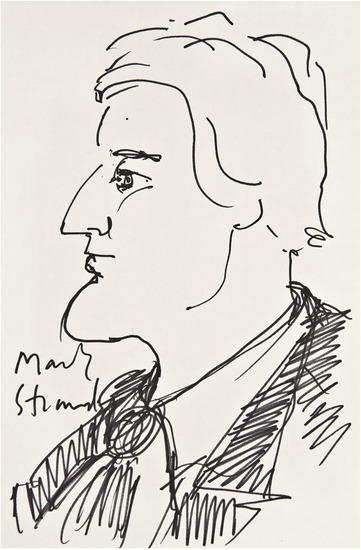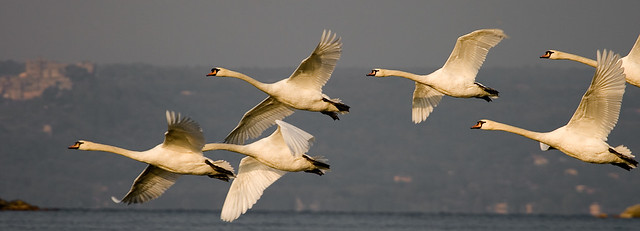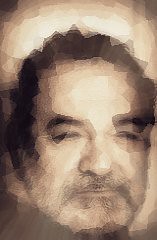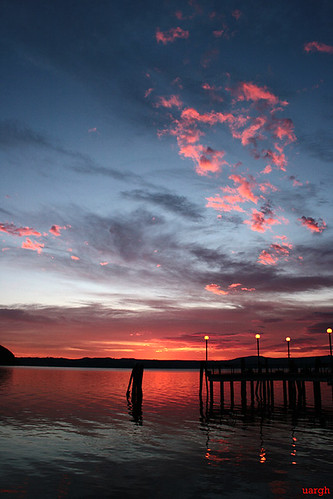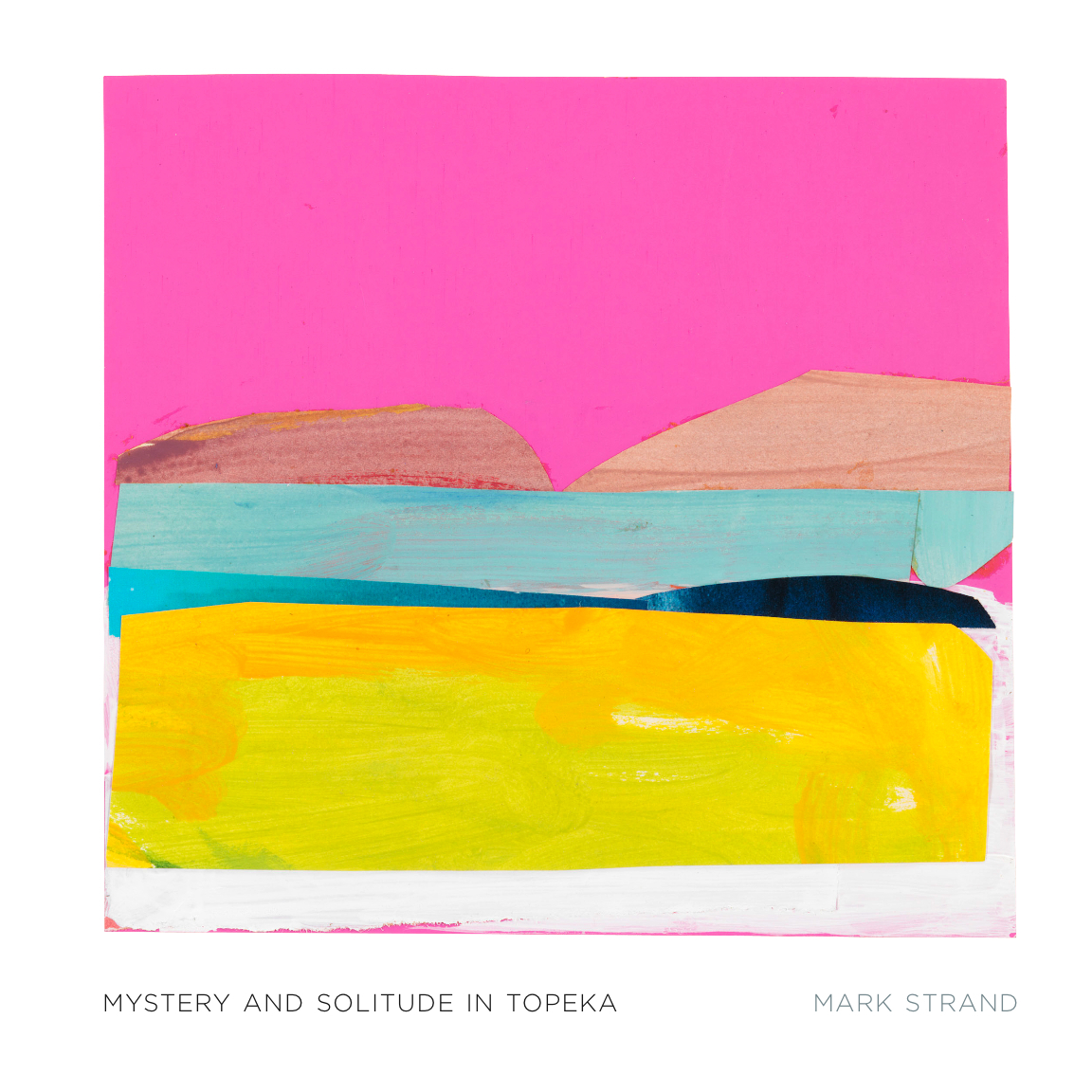THE UNTELLING
La denarrazione
He leaned forward over the paper
and for a long time saw nothing.
Then, slowly, the lake opened...
Si piegò sul foglio
e per molto tempo non vide niente.
Poi, lentamente, il lago si aprì
come un occhio bianco
e lui si sentì un bambino,
giocava con i cugini,
c' era un prato
ed un filare di alberi
giungeva fino all' acqua.
Era un tiepido pomeriggio d 'Agosto
e c' era un festa
che iniziava.
Si piegò sul foglio
e scrisse:
I waited with my cousins across the lake...
Aspettavo con i miei cugini oltre il lago,
e guardavo gli adulti passeggiare sulla riva lontana
lungo la sponda all' ombra degli olmi. Faceva caldo.
Il cielo era sereno. Io ed i cugini restammo
per ore tra i grossi rami, guardavamo
i nostri genitori, e sembrava che nulla sarebbe iniziato
nelle loro vite per farle cambiare , neanche l' uomo
che correva sul prato. agitava un foglio
di carta ed urlava. Si mossero al di là delle richieste
del tempo, oltre qualsiasi notizia vi fosse,
e non videro il buio che iniziava a diventare profondo
tra gli alberi e i cespugli, e risalire nelle pieghe
dei vestiti e sul bianco inamidato
delle loro camicie. Come onde giungevano
risate sull' acqua fin dove noi bambini stavamo a guardare.
Una scena che non era nostra. Noi eravamo
troppo lontano, e presto ce ne saremmo andati.
He leaned back
How could
the scene was not his?
Si sedette.
Come poteva sapere
che non era sua la scena?
L'estate era con lui,
le voci erano tornate, e vedeva i volti.
Il giorno era iniziato prima della festa;
la mattina era piovuto
e all' improvviso era tornato il sole.
Gli orli dei vestiti erano bagnati.
Le scarpe degli uomini luccicavano.
C' era una nuvola a forma di mano
che si abbassava piano.
Non c' era modo di sapere
perchè ci fossero momenti in quel pomeriggio
in cui il prato sembrava vuoto, o perchè ancora
si sentissero le voci degli adulti.
Prese quel che aveva scritto
e lo mise da parte.
Si sedette e scrisse di nuovo:
We all went to the lake, over the lawn...
Ce ne andammo tutti verso il lago, sul prato,
camminavamo senza dire una sola parola. Lontano
dalla casa, dove gli olmi ci facevano ombra.
Il sole si alzava, sollevando l' umidità, e faceva
risplendere il lago come una lamina chiara avvolta
dalla foschia. Ci sedemmo e guardammo l' acqua, poi
ci addormentammo sull' erba. Faceva più freddo.
Il vento scuoteva gli alberi. Restammo sdraiati così a lungo da immaginare
una mano che scostava le foglie cadute dai nostri volti.
Ma non era autunno , e alcuni di noi, i più giovani,
si alzarono e andarono sull' altra riva del lago
a fissare gli uomini e le donne che dormivano; gli uomini
con le bianche camicie inamidate, le donne nei vestiti dai colori chiari.
Li guardammo tutto il pomeriggio. E un uomo uscì di corsa
dalla casa, urlava e sventolava un foglio.
E chi dormiva si alzò come se non fosse accaduto niente,
come se la notte non avesse iniziato a muoversi
tra gli alberi. Sentimmo le loro risate, dopo
i loro sospiri. Si sdraiarono ancora, e l' oscurità cadde
sul prato e li nascose. Per quanto ne possiamo sapere
erano ancora là, le braccia incrociate sul petto,
gli abiti inamidati ormai gualciti. Non siamo più tornati.
He looked at what he had written...
Guardò quello che aveva scritto.
Quanto mancava ancora?
E perchè era diventato buio proprio allora?
E non era solo quando aveva guardato gli altri
sdraiati sul prato?
Guardava fisso fuori dalla finestra,
sperando che la gente vicino al lago,
il lago stesso, sarebbero svaniti.
Voleva andare oltre il suo passato.
Pensò che l'uomo
che correva sul prato gli sembrava familiare.
Guardò quello che aveva scritto
e si domandò come avesse attraversato il lago,
e se i suoi cugini fossero andati con lui.
Qualcuno aveva chiamato?
Qualcuno aveva alzato una mano per un saluto?
Quel che aveva scritto non gli diceva niente.
Lo mise da parte e ricominciò:
I waited under the trees in front of the house...
Attesi sotto gli alberi di fronte alla casa,
non pensando a nulla, guardando il bagliore del sole
sul tetto. Non sentii nulla,non provai
nulla, anche quando lei apparve in un lungo
abito giallo, scarpe bianche a punta, i capelli
raccolti stretti in una crocchia; anche quando
lei mi prese la mano e mi condusse lungo il filare
di alti alberi verso il lago là dove gli altri si erano riuniti,
gli uomini nelle camicie inamidate, le donne in
abiti estivi, i bambini che guardavano l' acqua.
Anche allora, la mia vita sembrava lontana
come se stesse aspettando che io la scoprissi.
Mi tenne per mano, mi condusse verso l ' acqua.
L' orlo del suo abito era bagnato. Non disse nulla
quando mi lasciò con i miei cugini e raggiunse
gli altri che se ne stavano insieme. Io sapevo, tra parentesi,
che avevano detto che qualcosa sarebbe successo, che qualcuno di noi,
i più giovani, se ne sarebbero andati quel pomeriggio
e non sarebbero più tornati. Camminavo nel bosco
verso l' altra sponda del lago, le loro voci svanirono
nel fruscio di foglie e rami nel sottobosco.
Mi allontanai, ma non aveva senso andarsene.
Mi sedetti a guardare la scena oltre il lago,
guardavo e non facevo nulla. Piccole onde di risa
si allargarono sull' acqua per poi morire.
Non ero commosso. Anche quando l' uomo
corse attraverso il prato gridando, io non feci nulla.
Era come se il vento trascinasse l' oscurità
dagli alberi fin sull' erba. Gli adulti se ne stavano
insieme. Non avrebbero mai lasciato quella riva.
Guardai la donna in giallo il cui nome
avevo iniziato a dimenticare e che aspettava con
gli altri e guardava fisso verso di me
ma non poteva vedermi. Già la luna piena
era sorta lasciando cadere le sue ceneri bianche nel lago.
E la donna e gli altri cominciarono lentamente
a spogliarsi, e le lievi folate di vento
sciacquarono loro la pelle, i corpi splendettero pallidi
per un breve momento tra le ombre finchè si sdraiarono
sull' erba madida. E tutti i bambini se ne erano andati.
E questo è tutto. Ed anche allora non provai
nulla. Seppi che non avrei mai più rivisto
la donna nel suo vestito giallo,
e che la scena vicino al lago non si sarebbe ripetuta,
e che quella estate sarebbe stata un luogo troppo distante
per trovarmici di nuovo.
Sebbene abbia tentato di ritornare, mi sono sempre
trovato qui, dove sono ora. Il lago
esiste ancora, ed anche il prato, ma le persone
che dormirono qui in quel pomeriggio non si sono più viste da allora.
It bothered him,
as if too much had been said...
Questo lo preoccupava,
come se troppo fosse stato detto.
Avrebbe preferito
il lago senza alcuna storia
o nessuna storia e nessun lago.
La sua ricerca era una forma di evasione:
più tentava di scoprire
più c' era qualcosa da nascondere
meno capiva.
Se avesse proseguito,
avrebbe perso tutto.
lo sapeva
e ricordò quel che poteva -
sempre da lontano,
sull' altra sponda del lago,
o oltre il prato,
svaniva per sempre, sempre lì.
E la donna e gli altri lo avrebbero salvato
e lui li avrebbe salvati.
Mise la mano sul foglio.
Avrebbe scritto una lettera all' uomo
che correva sul prato.
Avrebbe detto quello che sapeva.
Mise la testa tra le braccia e cercò di dormire.
Sapeva che la notte una volta era arrivata,
che qualcosa era accadutouna volta.
Voleva sapere,ma non voleva sapere.
Forse qualcosa era accaduto
in un pomeriggio d'agosto.
Forse lui era là o aspettava di essere là,
aspettava di attraversare un prato
verso un lago dove delle persone guardavano
oltre l'acqua.
Sarebbe arrivato correndo
e sarebbe stato ormai tardi.
Le persone sarebbero state addormentate.
I loro bambini sarebbero stati lì a guardarli.
Lui avrebbe portato quello che aveva scritto
poi si sarebbe sdraiato con gli altri.
Sarebbe stato l' uomo
che era diventato, l' uomo
che avrebbe corso attraverso il prato.
Ricominciò:
I sat in the house that looked down on the lake...
Sedevo nella casa che dà sul lago,
sul prato, i boschi accanto al prato. Sentiì
i bambini vicini alla riva, le loro voci si alzarono
là dove nessun ricordo del luogo sarebbe mai giunto.
Io guardai le donne, gli uomini vestiti in bianco, passeggiavano
nella calura di agosto. Chiusi la finestra
e li vidi passare atttraverso il vetro velato,
ogni volta più lontano. Gli alberi iniziavano
a scurirsi ed i bambini se ne andarono. Vedevo
l' acqua svanire in lontananza nell' ombra grigia
dell' erba e del sottobosco di là del lago.
Ho pensato di vedere i bambini seduti, guardavano
i padri e le madri in una lento corteo lungo
la riva. Le forme tra gli alberi cambiavano.
Avrebbe potuto essere un bambino quello ho visto, il suo viso.
Avrebbe potuto essere solo il mio volto che mi guardava.
Mi sentivo scendere dentro il futuro.
Guardavo oltre il prato, di là dal lago,
oltre il buio in attesa, la fine dell' estate,
la fine dell' autunno, l' aria gelida, il silenzio,
e ancora, di nuovo, il vetro della finestra. Io ero
dove ero, dove sarei stato, e dove sono.
Guardai gli uomini e le donne mentre l' occhio
bianco del lago cominciava a chiudersi e sprofondava
nel blu, infine nel nero. Era troppo tardi
per poter chiamare i bambini. Giacevano sull' erba
mentre il vento soffiava e cadevano le prime foglie.
Avrei voluto dir loro qualcosa. Vidi me stesso
correre, agitare un foglio, e poi gridare,
dire a tutti loro che avevo qualcosa da dare loro,
ma quando arrivai se ne erano andati.
He looked up from the paper
Alzò gli occhi dal foglio
e vide se stesso nella finestra.
Era una sera d' agosto
ed era stanco,
gli alberi oscillavano
il vento scosse la finestra.
Era tardi.
Non era importante.
Non avrebbe mai potuto raggiungere
il suo passato. La sua vita
rallentava.
Se ne andava.
Ne aveva coscienza,
poteva sentirlo nel suo discorso,
Poteva sembrare nulla,
tuttavia l' avrebbe tramandata.
E i suoi figli avrebbero vissuto in essa.
anche loro l' avrbbero tramandata,
e sarebbe sempre sembrato
come se la speranza morisse, che lo spazio si aprisse,
come un prato, o un lago,
un pomeriggio.
E il dolore non avrebbe potuto darle
il senso che mancava;
Non c' era alcun dolore,
soltanto la scomparsa.
Ma perchè aveva iniziato allora?
Era stanco,
e cadde in un sonno profondo,
e dormì dove si trovava,
e dormì senza sognare,
così quando si svegliò
gli parve che nulla fosse accaduto.
Il lago si aprì come un occho bianco,
gli olmi si alzarono sul prato,
ed il sole sopra gli olmi.
Era come se lo ricordava -
la bruma, il buio, la calura,
i boschi sull' altra sponda.
Sedette a lungo
e vide che erano arrivati
e stavano sul prato.
Lo aspettavano,
guardando la finestra dabbasso.
Il vento scompigliò loro i capelli
ma nessuno si mosse.
Aveva paura di seguirli.
Sapeva cosa sarebbe accaduto.
Sapeva che i bambini si sarebbero allontanati
che lui si sarebbe sdraiato con i loro genitori.
Ed ebbe paura.
Quando si voltarono
e camminarono fino al lago
tra l' ombra proiettata dagli olmi
I bambini si allontanarono davvero.
Li vedeva lontano, appena
oltre il lago, e si chiede se qualcuno
un giorno sarebbe tornato
proprio lì dove lui trovava adesso.
Vedeva gli adulti sul prato,
iniziavano a distendersi.
E volle avvisarli,
dire loro ciò che sapeva
Corse fuori dalla casa in direzione del lago,
sapeva che sarebbe stato troppo tardi,
che l' avrebbero lasciato solo
a continuare.
Quando arrivò al lago
se ne erano andati,
ed era solo nel buio
non poteva parlare.
Restò immobile.
Sentiva il mondo ritrarsi
dentro le nuvole,
nei ripiani di aria.
Chiuse gli occhi.
Pensò al lago,
ai muri di alghe.
Pensò alla falena addormentata
nella polvere delle sue ali,
al pipistrello appeso negli alberi cavi.
Sentì in quel momento di essere
più del suo bisogno di sopravvivenza,
più delle proprie perdite,
perchè lui era meno di qualsiasi cosa.
Oscillava avanti ed indietro.
Il silenzio era dentro di lui
e aumentava come la gioia,
come l' inizio.
Quando aprì gli occhi,
il silenzio dilagava, i fogli
di buio sembravano senza fine,
i fogli che aveva tenuti ben stretti in mano.
Volse le spalle e camminò verso la casa.
Arrivò nella stanza
che dava sul prato.
Si sedette ed iniziò a scrivere:
THE UNTELLING
To the Woman in the Yellow Dress





